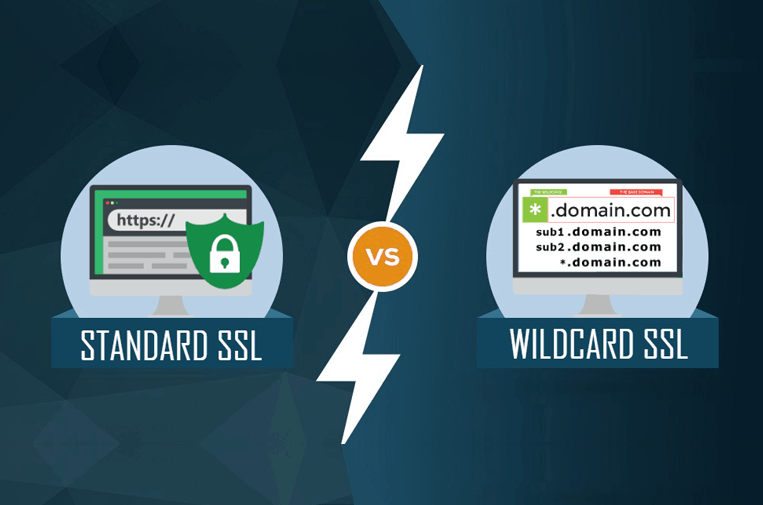
When you start a website, getting an SSL certificate to protect it has become the first logical step nowadays. With the increasing recommendation from Google and numerous cases of cybercrime, it’s imperative that you install an SSL certificate on your site to protect your users and their data from MITM (man-in-the-middle attack) and phishing attacks. Google also rewards those sites which take SSL security seriously by ranking their results higher in its search engine result pages (SERPs).
However, when you decide to purchase an SSL Certificate, the first question that you face is whether to go with a regular/standard SSL certificate or with a wildcard SSL certificate. And the answer is not so easy to find out. Before you can decide which of these certificates you should buy it’s important to understand the difference between Wildcard SSL and Standard SSL.
But don’t worry – we’re going to explain everything to you in this article. And in the end, you’ll be able to choose which one you should go with. Let’s get started:
Table of Contents
Similarities: Wildcard SSL & Regular Certificate
Before we boil down the difference between both regular/standard and wildcard certificate, it’s also a good idea to understand what similarities they have. And the first similarity is that both offer industry-grade strong encryption up to 256 bits. Both are trusted universally across the browsers and servers, and both use 2048-bit RSA signature keys. Both are also enough to give positive ranking impact in Goggle search results.
With that in mind, now let’s look at what’s not same in both these certificates.
Wildcard SSL vs Standard SSL Certificate
Wildcard Certificate
- It protects a domain and its unlimited subdomains in its hierarchy. If we compare it with the help of the example then we can not only protect example.com and subdomain.example.com but also support.example.com, about.example.com and any other subdomains that carry the first level of the main domain if the certificate is taken for domain *.example.com. That way a wildcard cert serves as a single solution for all your subdomains security.
- However, it’s also worth mentioning that even the certificate can’t protect your subdomains if they’re more than one level away from the root domain. For example, while support.example.com can be protected, chat.support.example.com can’t be protected under *.example.com. That feat is achieved only by multi-domain wildcard SSL certificate, which cost much more than wildcard SSL cert or single wildcard cert has taken for *. support.example.com
- In addition to that, wildcard SSL certificates cannot be purchased with extended validation (EV) option. That means you can’t have that green bar telling the name of your company in the browser if you decide to use a wildcard certificate. You need to settle with DV or OV certificate only for wildcard SSL. There’s no way to bypass this thing, and this is a compromise you must make if you want to protect your main domain and all its immediate first-level subdomains with a wildcard SSL certificate.
Standard Certificate
- A standard or regular certificate, on the other hand, protects only one domain or one subdomain. For instance, if you have a website www.example.com, with a standard certificate you can only protect www.example.com and example.com but not subdomain.example.com. If you have to secure subdomain of the website then you can protect them with a certificate, but for that, you need to purchase an individual regular SSL certificate for each subdomain.
- However, that doesn’t mean there are only limitations in normal SSL certificate. It also has some special advantages. For instance, a standard cert can be purchased in all 3 types of validation: Domain Validation (DV), Business/Organization Validation (OV) and Extended Validation (EV). All these levels of validation represent 3 different levels of security that you can expect from your certificate.
- DV certificates are given right after the validation of domain ownership.
- BV/OV certificates are given after validation of domain and business credentials verification.
- EV certificates are given after validation of domain ownership, business credentials and many other things. A stronger validation process of the certificate means more authenticity and difficulty for criminals to steal it.
- It’s also worth noting that both www and non-www versions of a site can be protected with these single-domain SSL certificates.
| Wildcard Certificate | Standard Certificate |
|---|---|
| Add as many first-level subdomains as you want | Can’t be used to protect all subdomains of a website |
| It is available for DV and OV | Can be purchased for DV, OV and EV |
| It saves time & cost on subdomains certificate management | It is time-consuming because of individual certificate management for each subdomain |
Which one should you use?
Like most things in cyberspace, the answer depends upon what are your requirements. If you have a single website, and you’re sure that you won’t be adding multiple domains later, you can go with a regular SSL certificate. On the other hand, if your website divides into subdomains, or you plan to divide it into subdomains later, then you’ll be better off with a wildcard SSL certificate.
So that’s the difference between Wildcard SSL and Standard SSL certificate. Hopefully, we could explain it to you in a thorough manner. Now it should be easy for you to make a choice between both these SSL certificates.
